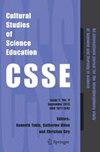Performing legitimate choice narratives in physics: possibilities for under-represented physics students
IF 1.5
4区 教育学
Q2 CULTURAL STUDIES
引用次数: 0
Abstract
Abstract Higher education physics has long been a field with a disproportionately skewed representation in terms of gender, class, and ethnicity. Responding to this challenge, this study explores the trajectories of “unexpected” (i.e., demographically under-represented) students into higher education physics. Based on timeline-guided life-history interviews with 21 students enrolled in university physics programs across Sweden, the students’ accounts of their trajectories into physics are analyzed as choice narratives . The analysis explores what ingredients are used to tell a legitimate story of physics participation, in relation to dominant discourses in physics culture, and wider social and political discourses. Results indicate that students narrate their choice as based on motivations of physics being a prestigious and challenging subject, of a deep interest in and a natural ability for physics, as well as a wish to use physics for contributing to the world. While most of these affiliations to physics has been documented in earlier research, the study shows how they are negotiated in relation to social locations such as gender, class and migration history, and used to perform an authentic and legitimate choice narrative in the interview situation. Furthermore, the study reports and discusses the possibility of conceiving the role of physics in students’ lives as something beyond a “pure”, intellectually challenging, and “prestigious” subject. In contrast, and with implications for widening participation, the stories of “unexpected” physics students indicate that physics can be reconceived as socially and altruistically oriented.在物理中执行合理的选择叙述:对代表性不足的物理学生的可能性
高等教育物理学长期以来一直是一个性别、阶级和种族比例失调的领域。为了应对这一挑战,本研究探索了“意想不到的”(即人口统计学上代表性不足的)学生进入高等教育物理的轨迹。基于对21名瑞典大学物理专业学生的时间线引导的生活史访谈,学生们对他们进入物理学的轨迹的描述作为选择叙事进行了分析。分析探讨了在物理文化中的主导话语以及更广泛的社会和政治话语中,使用哪些成分来讲述物理参与的合法故事。结果表明,学生们将他们选择物理学的动机描述为一门享有盛誉和具有挑战性的学科,对物理学有浓厚的兴趣和天生的能力,以及希望用物理学为世界做出贡献。虽然这些与物理学的联系在早期的研究中已经被记录下来,但这项研究显示了它们是如何与社会位置(如性别、阶级和移民历史)联系起来的,并用于在面试中表现出真实和合理的选择叙述。此外,该研究报告并讨论了将物理学在学生生活中的作用设想为超越“纯粹”、智力挑战和“声望”学科的可能性。相比之下,“意想不到的”物理学学生的故事表明,物理学可以被重新理解为社会和利他主义导向。
本文章由计算机程序翻译,如有差异,请以英文原文为准。
求助全文
约1分钟内获得全文
求助全文
来源期刊

Cultural Studies of Science Education
Multiple-
CiteScore
3.10
自引率
0.00%
发文量
45
期刊介绍:
Cultural Studies of Science Education is a peer reviewed journal that provides an interactive platform for researchers working in the multidisciplinary fields of cultural studies and science education. By taking a cultural approach and paying attention to theories from cultural studies, this new journal reflects the current diversity in the study of science education in a variety of contexts, including schools, museums, zoos, laboratories, parks and gardens, aquariums and community development, maintenance and restoration.
This journal
focuses on science education as a cultural, cross-age, cross-class, and cross-disciplinary phenomenon;
publishes articles that have an explicit and appropriate connection with and immersion in cultural studies;
seeks articles that have theory development as an integral aspect of the data presentation;
establishes bridges between science education and social studies of science, public understanding of science, science/technology and human values, and science and literacy;
builds new communities at the interface of currently distinct discourses;
aims to be a catalyst that forges new genres of and for scholarly dissemination;
provides an interactive dialogue that includes the editors, members of the review board, and selected international scholars;
publishes manuscripts that encompass all forms of scholarly activity;
includes research articles, essays, OP-ED, critical, comments, criticisms and letters on emerging issues of significance.
 求助内容:
求助内容: 应助结果提醒方式:
应助结果提醒方式:


